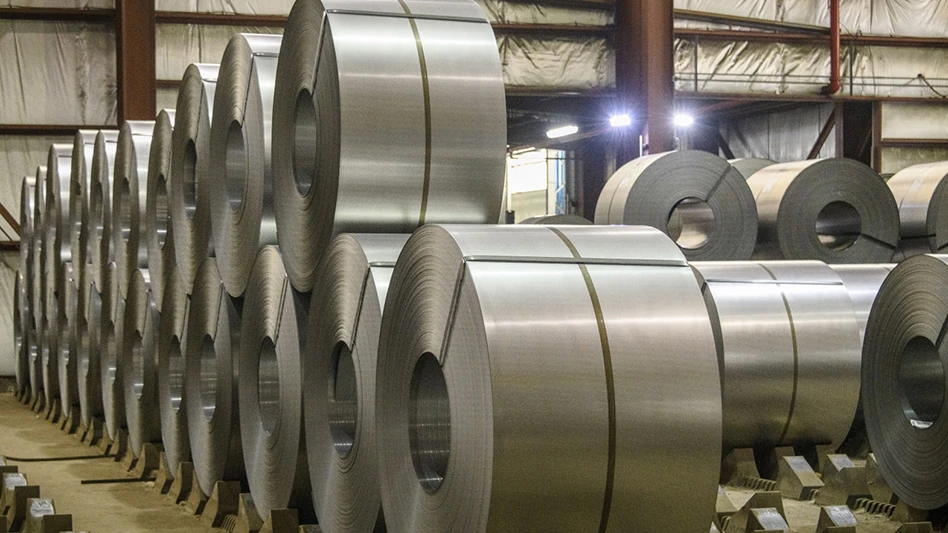
Photo courtesy of Cleveland-Cliffs Inc.
Cross-border trade in finished and semifinished steel to and from the United States involves numerous trading partners, but two nations in particular—Mexico and China—were singled out at a late June news conference.
The event was held at the Cleveland works of iron mining and steelmaking company Cleveland-Cliffs Inc. On the stage were the CEO of Cliffs, three representatives from the United Steelworkers (USW) union and Sen. Sherrod Brown of Ohio.
Brown set the tone by stating that steel industry investments “never pay off if we let other countries break the rules. Right now, Mexico is doing that; we know that," he said.
Standing near a steel galvanizing line at the Cleveland facility, the senator said shipments from Mexico to the U.S. of corrosion-resistant steel currently are triple the historical average. He characterized imports of Mexican steel into the U.S. as “having hit unsustainable levels.”
“They show no sign of slowing down, violating a 2018 agreement between the U.S. and Mexico," Brown said.
Brown also was the first news conference participant—but not the last—to refer to perceived triangular trading involving steel from China being shipped to Mexico before crossing the border into the U.S.
“It’s not just Mexican steel that’s coming in, it’s Chinese steel,” Brown said. “Mexico is just a pit stop along the way as Chinese steel makes its way into the U.S. illegally, all to evade tariffs. We’ve seen China do it again and again and again. They find new ways to cheat [and] unfair trade practices, and it works.”
Data gathered by the U.S. Census Bureau and aggregated by the Washington-based American Iron and Steel Institute (AISI) show Mexico is a sizable shipper of steel to the U.S., but that its volume has dropped over the past 12 months.
According to the AISI, in the 12-month period from June 2023 to May 2024, Mexico was the second largest supplier of imported steel, trailing Canada by some 2.7 million tons. As well, the Mexican volume of 4.0 million tons was down by 16 percent compared with what was shipped from June 2022 to May 2023.
Shipments coming directly from China totaled 180,000 tons in the first five months of this year, ranking it 13th on the list of exporters of steel to the U.S.
Nonetheless, those two nations bore the brunt of the criticism from Brown, Cliffs CEO Lourenco Goncalves and USW President David McColl.
“It’s the so-called free traders [who] ignore the cheaters who dump their products in our country and violate the law,” McColl said. “When violators like China are identified and stopped [and then] abuse the USMCA, action must be taken,” he added, referring to the 2020 United States-Mexico-Canada Trade Agreement.
Goncalves praised Brown as a longtime fighter for a “level playing field” for American-made steel and referred to McColl and the USW as valuable business partners.
He minced no words in portraying Mexican export practices as harmful to his company and the nation’s workers.
“We need to keep Mexico outside of this [USMCA] trade agreement that only has benefits for Mexico and nobody else,” Goncalves said. “The only thing Mexico brings to the table is cheap labor. No one will ever convince me that there is any benefit to manufacture something in Mexico that is coming back to the United States. We’re just paying freight, and not paying people. That’s wrong. It’s morally wrong, economically wrong; there is no good [in] that.
“I am a big defender that when the review of the USMCA comes to bear in 2026, we’re going to drop the ‘M.’ It will just be USCA. That will be a good day for Lourenco Goncalves and Cleveland-Cliffs.”
He also said his company’s cooperation with the USW—which has been a significant factor in the Cliffs bid to acquire Pittsburgh-based U.S. Steel Corp.—is the beginning of a “wave of change” in America.
“This partnership between management and labor that Cleveland-Cliffs has, I know it’s kind of unique; I know that,” Goncalves said. “But it’s just the beginning of a wave of change that will come to this country, because when people realize that when labor and companies can work together and be good for everybody—including investors—and everybody can make money, this will take hold. We have planted the seeds; we are showing the way.”
When asked about the pending purchase of U.S. Steel by the Japan-based Nippon Steel Corp. (NSC), the news conference participants unanimously expressed their opposition to the transaction.
Goncalves cited stated opposition by both presidential candidates and said regarding the prior Cliffs bid for U.S. Steel, “My position on this deal has never changed since Day 1. I’m just waiting for things to happen the way the two presidential candidates said they will do” regarding denying approval of the NSC acquisition.
The CEO, who consulted with the USW on his bid for U.S. Steel, said the NSC approach was different. NSC not talking to McColl before the deal “was the biggest mistake I have seen in my life,” he said.
Brown made a similar observation, saying that he had a bad initial impression of NSC for the same reason. He said his view on mergers is the same as it is for cross-border trade pacts.
“The most important thing on trade deals is that workers are at the table from day one,” he said.
Latest from Recycling Today
- Lautenbach Recycling names business development manager
- Sebright Products partners with German waste management equipment company
- WasteExpo transitions to biennial format for enhanced experiences
- Study highlights progress, challenges in meeting PCR goals for packaging
- Washington legislature passes EPR bill
- PureCycle makes progress on use of PureFive resin in film trials
- New copper alloy achieves unprecedented high-temperature performance
- Gränges boosts profits and sales volume in Q1 2025





